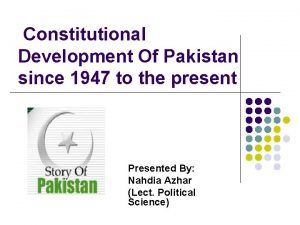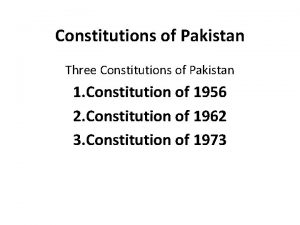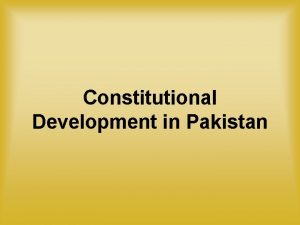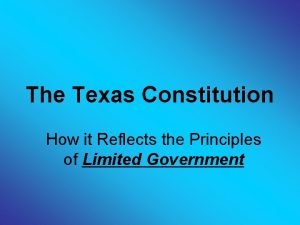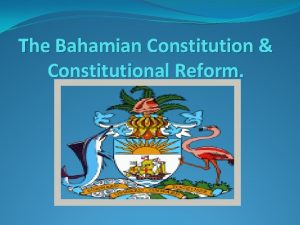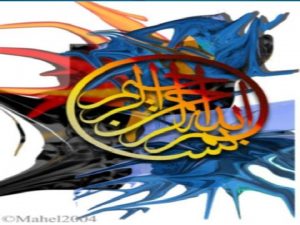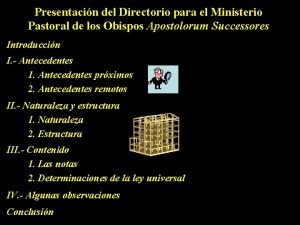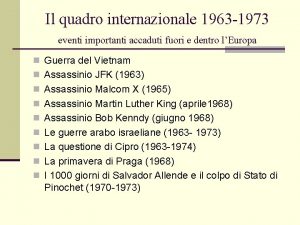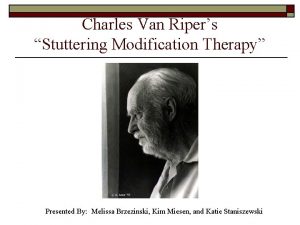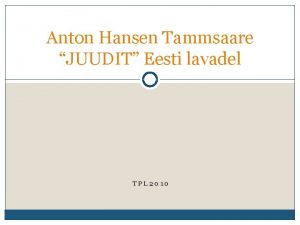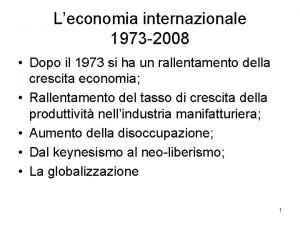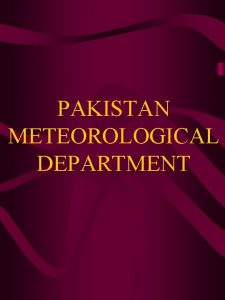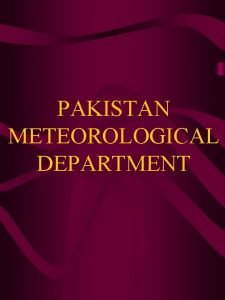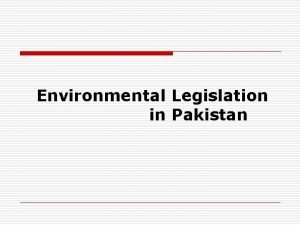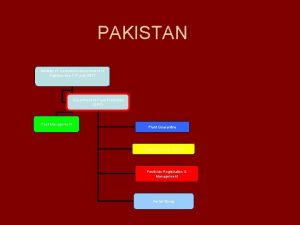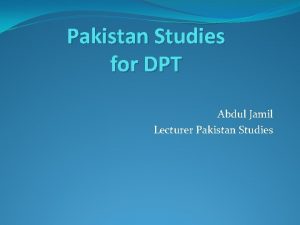Constitution of Pakistan of 1973 Introduction The Constitution





















- Slides: 21

Constitution of Pakistan of 1973

Introduction �The Constitution of the Islamic Republic of Pakistan (Urdu: ( آﺌیﻦ پﺎکﺴﺘﺎﻥ is the supreme law of the State of Pakistan. �The Constitution is supreme document of Pakistan which identifies the state (its physical existence and its borders), people and their fundamental rights, state's constitutional law and orders, and also the constitutional structure and establishment of the institutions and the country's armed forces.

Cont… �The first three chapters establish the rules, mandate, and Separate Powers of the three branches of the government: a legislature, a Bicameral Parliament; an executive branch governed by the Prime Minister as Chief Executive; and an apex federal judiciary head by Supreme Court. �The Constitution lay the establishment of President of Pakistan who is the ceremonial figurehead (Head of State) and its role is to represent the unity of the state. �Drafted by the government of Zulfikar Ali Bhutto, with an additionally assistance from the country's Opposition Parties, it was approved by

Cont… �Unlike the previous legal documents of 1956 and 1962, the 1973 constitution cannot be changed; instead, constitutional amendments are added to it, altering its effect. �The first six articles of the constitution outlines the Political System as Federal Parliamentary Republic system; as well as Islam as its State Religion. �The Constitution guides Pakistan's law and its political culture, system and its physical existence. �It has been amended over time, and most recent impulses for political upgrades and reforms has been amended.

Drafting and Enactment �After gaining power, Zulfiqar Ali Bhutto invited the leaders of the parliamentary parties to meet him on 17 April 1972, which resulted in an agreement known as the 'Constitutional Accord', after an intensive discussion. �As per consultations floated by PPP, the National Assembly of Pakistan appointed a committee, of 25 members, on 17 October 1972, to prepare a draft of the permanent Constitution of Pakistan. �Mahmmad Ali Kasuri was the elected chairman of the Committee. �On 20 October 1972, the draft bill for the Constitution of Pakistan was signed by leaders of all parliamentary groups in the National Assembly.

Cont… �A bill to provide a constitution for the Islamic Republic of Pakistan was introduced in the Assembly on 2 February 1973. �The Assembly passed the bill nearly unanimously on 19 April 1973 and endorsed by the acting President Zulfikar Ali Bhutto on 12 April 1973. �The Constitution came into effect from 14 August 1973. On the same day, Bhutto took over as the Prime Minister and Choudhary Fazal-e-Elahi as the President of Pakistan.

Provisions �This constitution represented a compromise consensus on three issues: the role of Islam, the sharing of power between the federal government and the provinces, and the division of responsibilities between the President and the Prime Minister, with a greatly strengthened position for the latter. �The Constitution provided for a federal system. The Federal Legislature is to function like the British Parliament. �In order to allay the concerns of the provinces concerning the equitable distribution of legislative power, the constitution established a bicameral legislature with a Senate (the upper house),

Cont… �Islam was declared the State Religion. The Constitution stated Pakistan's official name as the Islamic Republic of Pakistan. Only a Muslim could become the President or the Prime Minister of Pakistan. No law repugnant to Islam shall be enacted and the present laws shall also be Islamised. �The President must be a Muslim not less than 45 years of age, elected by members of Parliament. �He is to hold office for a term of five years. �The President could be removed by the resolution of parliament of not less than two thirds of the total membership.

Cont… �The President has the power of granting pardon and the right to be kept informed by the Prime Minister on all matters of internal and foreign policies. �The Constitution sets forth the parliamentary system of Government. The head of the Government, according to the Constitution, will be the Prime Minister. The Prime Minister and his Cabinet is accountable to the National Assembly for his actions. The Prime Minister would be elected by the majority of the National Assembly.

Cont… �The Constitution of 1973 introduced a new institution known as the 'Council of Common Interests' consisting of Chief Ministers of the provinces and an equal number of Ministers of the Federal Government nominated by the Prime Minister. �The Council could formulate and regulate the policy in the Part II of the Legislative List. In case of complaint of interference in water supply by any province the Council would look into the complaint. �Another major innovation in the Constitution of 1973 is the establishment of a National Finance Commission (NFC) consisting of the Federal and Provincial Finance Ministers and other members to advice on distribution of revenues between the

Cont… �The Principles of Policy includes Islamic way of life, promotion of Local Government institutions, full participation of women in national life, protection of minorities, promotion of social and economic well being of the people, and strengthening the bonds with the Muslim world and to work for international peace. �Urdu is the national language.

Cont… �Under the 1973 Constitution, Fundamental Rights include security of person, safeguards as to arrest and detention, prohibition of Slavery and Forced Labor, Freedom of Movement, Freedom of Association, freedom of speech, freedom to Profess Religion and safeguards to religious institutions, nondiscrimination in respect of access to public places and in service, preservation of Languages, script and Culture. The judiciary enjoys full supremacy over the other organs of the state.

Islamic Provisions �The name 'Islamic Republic of Pakistan' is selected for the state of Pakistan. �Islam is declared as the state religion of Pakistan. �Steps shall be taken to enable the Muslims of Pakistan, individually or collectively, to order their lives in accordance with the fundamental principles and basic concepts of Islam. �Steps shall be taken to make the teaching of the Qur'an and Islamiyat compulsory, to encourage and facilitate the learning of Arabic language and to secure correct and exact printing and publishing of the Qur'an. �Proper organization of Zakat, waqf and mosques is

Cont… �The state shall prevent prostitution, gambling and consumption of alcohol, printing, publication, circulation and display of obscene literature and advertisements. �Only a Muslim could be qualified for election as President (male or female) and Prime Minister (male or female). No restriction as to religion or gender on any other post, up to and including provincial governor and Chief Minister. �All existing laws shall be brought in conformity with the injunctions of Islam as laid down in the Qur'an and Sunnah and no law shall be enacted which is repugnant to such injunctions.

Cont… �A Council of Islamic Ideology shall be constituted referred to as the Islamic Council. The functions of the Islamic Council shall be to make recommendations to Parliament and the Provincial Assemblies about the ways and means of enabling and encouraging the Muslims of Pakistan to order their lives in accordance with the principles of Islam. �The President or the Governor of a province may, or if two fifths of its total membership so requires, a House or a Provincial Assembly shall, refer to the Islamic Council for advice on any question as to whether a proposed law is or is not repugnant to the injunctions of Islam.

Cont… �For the first time, the Constitution of Pakistan gave definition of a Muslim which states: 'Muslim' means a person who believes in the unity and oneness of Allah, in the absolute and unqualified finality of the Prophethood of the Islamic Prophet, Muhammad, and does not believe in, or recognize as a prophet or religious reformer, any person who claimed or claims to be a prophet, in any sense of the word or of any description whatsoever, after Muhammad. �The Second Amendment (w. e. f 17 September 1974) of the 1973 Constitution declared for the first time the Ahmadiyya Community or the Lahore Ahmadiyya Movement for the Propagation of Islam (Lahoris) as non-Muslims, and their

Comparison with Previous Constitutions � With regard to provincial rights the 1973 constitution was in fact the most centralized of Pakistan's various constitutions. � The Government of India Act of 1935, which Pakistan adopted as its first working constitution, granted the federal government 96 items of power. � The 1956 constitution reduced that number to 49, and this was retained in the 1962 constitution. In 1973, however, it was then enlarged to 114.

Pakistani Leadership � 1947 -1948 Muhammad Ali Jinnah (Governor General) � 1948 -1951 � 1951 -1958 � 1958 -1969 Liaquat Ali Khan (Prime Minister) Six Different Prime Ministers General Ayub Khan (President)

Pakistani Leadership � 1969 -1973 General Yahya Khan (Military Leadership) � 1973 -1977 Zulfiqar Ali Bhutto (Prime Minister) � 1977 -1988 General Zia ul-Haq (President) � 1988 -1990 Benazir Bhutto (Prime Minister) 1993 -1996

Pakistani Leadership � 1990 -1993 1997 -1999 � 1999 Nawaz Sharif (Prime Minister) General Pervez Musharraf � 2008 -2013 Asif Ali Zardari (President) � 2008 -2012 Yousuf Raza Gilani (Prime Minister)

Pakistani Leadership � 2012 -2013 Raja Pervaiz Ashraf (Prime Minister) � 10 th Sept 20 -13 -to date Mamnoon Hussain (President) �May 2013 -to date Namaz Sharif (Prime Minister)
 Constitutional development in pakistan from 1947 to 1973
Constitutional development in pakistan from 1947 to 1973 Three constitutions of pakistan
Three constitutions of pakistan Salient features of objective resolution
Salient features of objective resolution Texas constitution vs u.s. constitution venn diagram
Texas constitution vs u.s. constitution venn diagram Nc constitution vs us constitution
Nc constitution vs us constitution Constitution what is constitution
Constitution what is constitution Lesson 1 principles of the constitution
Lesson 1 principles of the constitution Curriculum development process in pakistan
Curriculum development process in pakistan Ul 9540 battery
Ul 9540 battery Pincus and minahan (1973 reference)
Pincus and minahan (1973 reference) Wickens
Wickens Ecclesiae imago 1973
Ecclesiae imago 1973 Marina abramović body art
Marina abramović body art Ley 23 de 1973
Ley 23 de 1973 Kessie v charmant 1973
Kessie v charmant 1973 1973 eventi importanti
1973 eventi importanti Apartment ownership law no 39 of 2003
Apartment ownership law no 39 of 2003 Ainsworth fungi classification
Ainsworth fungi classification Van riper 1973
Van riper 1973 Who wrote the lyrics to candle in the wind
Who wrote the lyrics to candle in the wind First mri image 1973
First mri image 1973 Näitleja 1894-1973
Näitleja 1894-1973
